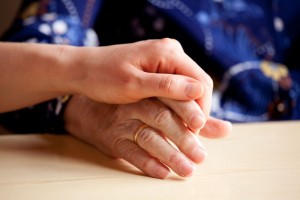Why the Way We Live is More Important
 Photo by leaf / 123RF
Photo by leaf / 123RF I was nine when my mom beamed at my fifth-grade teacher and told him he was the best Christian she’d ever known.
Except, of course, that he wasn’t; Mr. Goldstein was Jewish.
Though she’d die rather than say anything like that now, that day my mother embedded in me a truth that has been with me since: Christianity, for many of its liberal followers, has little to do with doctrinal beliefs and everything to do with how you live your life. Saying someone was a “good Christian” meant he or she was compassionate and caring, hard-working and dedicated to the common good—high praise, as my mother had intended it to be. Still, years before the term “politically correct” took root in North America, I felt embarrassed by her compliment.
As I grew, my religious tradition shamed me regularly and in far worse ways. The “Live Love” stickers we collected from Sunday school grew tainted with stories of blood and horror. I learned that my paternal ancestors had converted to Christianity from Judaism and fled Spain in the late fifteenth century as persecutions based on doctrinal purity filled the air with the reek of burning flesh. The evening newscasts I’d watch covered stories of Christians shooting abortion doctors, beating gays to death, and picketing ordinations of women. One Church of England rector suggested women priests should be burned at the stake. I kept that article on the dashboard of my car for years.
My evolving understanding of the Abrahamic God condoned neither Christianity’s historical atrocities nor its contemporary headlines. Rather, it reinforced the demand for compassionate response to the complexities of human life and led me to reject much that is taught as Christianity. Eventually, I came to realize that what I name “god” is not at all exclusive to that term, or to Christianity and its Abrahamic siblings. It is an amalgam of humanistic principles bound up with the belief that, because we need one another, we must learn how to love one another. It is something shared throughout the human family that, over the course of our long history together, has birthed diverse traditions and religions.
But humanity no longer needs specialized language or religious doctrine to bring it to life. Wonder, beauty, goodness, and compassion can be lived into being every time we chose to care beyond our own self-preservation. I now identify as an atheist and no longer use the word “god” to speak of a humble existence within the beauty of life.
Still, I have goals and they do concern the god called God. Basically, I want to depose him. Not that you can’t believe in him if you want to; go ahead. But I want us to think like my mother thought back in the late sixties. I want us to make the way we live more important than what we believe, even—and especially—if we’re religious. In other words, if you believe in the god called God (or follow another centuries-old religious practice), I want you to put living a virtuous life—one guided by love, justice, and compassion—before whatever your religious tradition might tell you to do. If it happens to be exactly what your tradition would tell you to do, fantastic! But if it isn’t, think twice and put love first.
I’m not an academic. I’m a practitioner. I work with people and my passion is inspiring them to engage life and bend its future toward goodness, beauty, and truth. Healthy, resilient, compassionate beings are the only ones who can do that. Our evolution as an empathic species depends on finding ways to prepare and nurture them for the task. Liberal, mainline communities of faith have often been stellar examples of how to do that. I’ve seen the transformational gift they can be in the work of challenging and nurturing people within an environment that literally grows wellbeing. I want to see those communities and others step into the crucial work of inspiring well-being apart from religious doctrine and language. They can do that however they like, but a compassionate future for all depends on the way we live, not what religious beliefs we hold.
A colleague once argued that, rather than less Bible in the world, there should be more. I asked what that would look like. Tapping her forefinger on the table between us, she said, “We would be feeding the poor.” But feeding the poor doesn’t begin and end with Christianity as she supposes. So I told her I didn’t need the Bible to tell me to feed the poor. She snapped, “Who taught you that?” And then, with barbed sarcasm, added, “Your mother?”
Actually, yes. Though she may have once believed compassion, love, and justice to be particular to Christianity, she taught me to celebrate them wherever they were found. And, if I couldn’t find them, she encouraged me to bring them into being myself. It was my mother, not Christianity, who taught me that the way we live is far more important than what we believe.
